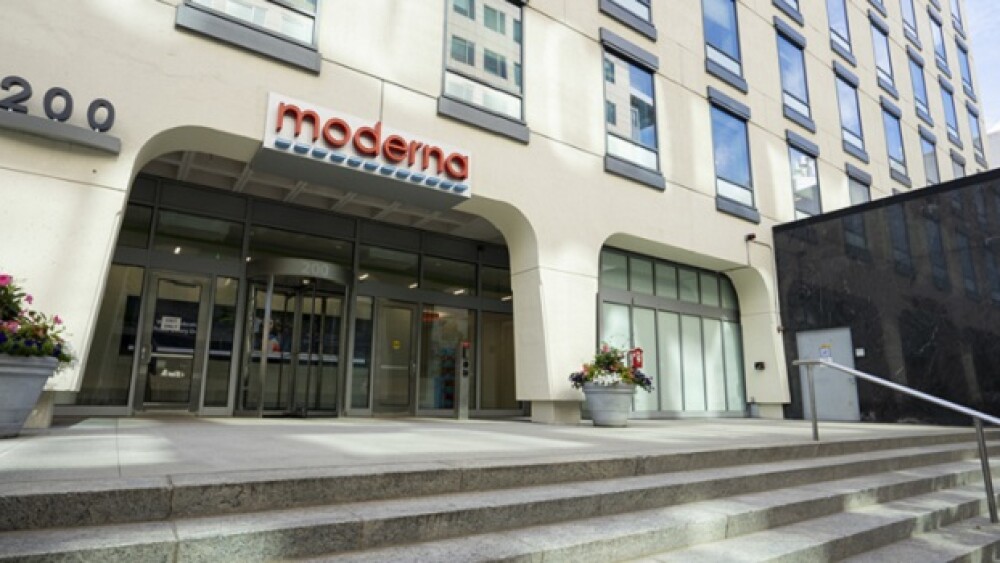The companies will evaluate Moderna’s investigational Claudin18.2 mRNA cancer vaccine in combination with CARsgen’s Claudin18.2 CAR T cell candidate.
Pictured: Moderna sign on building in Cambridge/iStock, hapabapa
Moderna and China’s CARsgen Therapeutics are collaborating to combine their respective mRNA therapeutic cancer vaccine with a solid tumor CAR T cell therapy, the Chinese biotech announced on Monday.
Under the agreement, the companies are looking to evaluate Moderna’s investigational Claudin18.2 mRNA cancer vaccine in combination with CARsgen’s Claudin18.2 CAR T cell candidate (CT041) in preclinical and Phase I studies.
Lin Guey, Moderna’s CSO of external research, said in a statement that Claudin18.2 is a “promising therapeutic target to potentially treat multiple cancer types with high unmet medical need.” He added that the partnership with CARsgen will “explore the potential synergy of CAR-T with an investigational mRNA cancer vaccine that encodes for the Claudin18.2 protein.”
An isoform of Claudin18, the Claudin18.2 protein is a highly selective biomarker with limited expression in normal tissues and often abnormal expression in various malignant tumors. Given this specific expression pattern, Claudin18.2 has emerged as a unique molecule for targeted therapy in different cancers, particularly those originating in the stomach.
CT041, an autologous CAR T cell product, was granted Regenerative Medicine Advanced Therapy (RMAT) Designation by the FDA in January 2022 for the treatment of advanced gastric cancer and gastroesophageal junction cancer with Claudin18.2-positive tumors. In October 2020, the candidate received Orphan Drug designation from the regulator also for the treatment of GC and GEJ.
In May 2023, CARsgen announced the initiation of patient enrollment in a Phase II trial for CT041 in the U.S. for the treatment of Claudin 18.2–positive advanced gastric cancer and gastroesophageal junction cancer in patients who have failed at least two prior lines of systemic therapies.
CARsgen CEO and CSO Zonghai Li in a statement described CT041 as the “most advanced solid tumor CAR-T in development” and noted that it “continues to show promise in treating gastric and pancreatic cancers.” Li said that “attacking tumors with CAR T-cell therapy in combination with a cancer vaccine could potentially provide greater clinical benefit to patients,” noting Moderna’s leadership in the field of mRNA-based vaccines and therapeutics.
In July 2023, Moderna and Merck announced the initiation of a pivotal Phase III high-risk melanoma trial combining the companies’ mRNA-based personalized cancer vaccine with Merck’s blockbuster Keytruda checkpoint inhibitor. After a successful Phase IIb trial in stage III/IV melanoma patients with high risk of recurrence after surgery, the companies are running a Phase III study in an expanded population that includes stage IIb–IV patients. The study will enroll around 1,089 patients at more than 165 sites and in over 25 countries.
Greg Slabodkin is the News Editor at BioSpace. You can reach him at greg.slabodkin@biospace.com. Follow him on LinkedIn.






